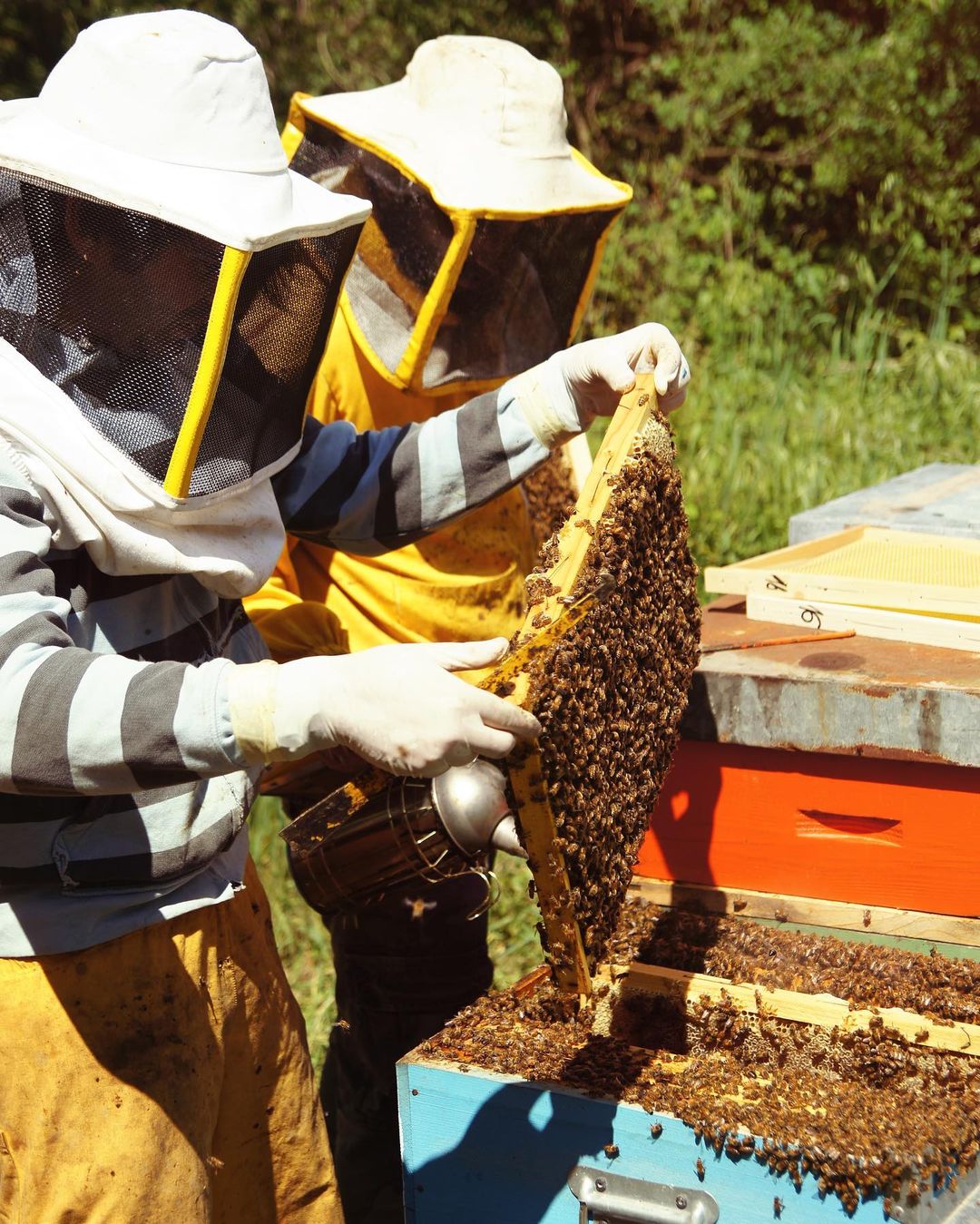Révolutionner l'apiculture : Un regard sur les innovations récentes et les perspectives futures.
L'apicoltura è da tempo una pratica essenziale per la conservazione delle popolazioni di api e del ruolo fondamentale che svolgono nell'impollinazione. Nel corso degli anni, i progressi nelle tecniche e nelle tecnologie dell'apicoltura hanno mirato a migliorare la produzione di miele, la salute dell'alveare e la sostenibilità. In questo post del blog, approfondiremo i recenti sviluppi nell'apicoltura, come stanno rivoluzionando il settore e faremo luce sui piani futuri per questa pratica cruciale.
Progressi tecnologici:
a) Monitoraggio intelligente dell'alveare: con l'avvento della tecnologia Internet of Things (IoT), gli apicoltori hanno ora accesso a sistemi di monitoraggio intelligenti dell'alveare. Questi sistemi utilizzano sensori posizionati all'interno degli alveari per raccogliere dati in tempo reale su temperatura, umidità, peso dell'alveare e comportamento delle api. Gli apicoltori possono monitorare da remoto i loro alveari tramite app mobili, consentendo loro di rilevare tempestivamente i problemi e adottare le misure necessarie per prevenire malattie o sciami.
b) Apicoltura di precisione: le tecniche di agricoltura di precisione hanno trovato la loro strada nell'apicoltura, consentendo pratiche più mirate ed efficienti. I droni dotati di telecamere multispettrali possono sorvegliare ampie aree e fornire informazioni preziose sulle risorse floreali, aiutando gli apicoltori a ottimizzare il posizionamento degli alveari e i modelli di foraggiamento delle api.
Apicoltura sostenibile:
a) Controllo naturale dei parassiti: i tradizionali trattamenti chimici contro parassiti come gli acari Varroa hanno sollevato preoccupazioni sul loro impatto sulle api e sull'ambiente. Tuttavia, sono emerse alternative sostenibili, come l'uso di vespe parassite che predano gli acari Varroa, riducendo così la dipendenza dai trattamenti chimici.
b) Promozione delle piante autoctone: gli apicoltori e le organizzazioni ambientaliste stanno promuovendo attivamente la piantumazione di piante da fiore autoctone che forniscono una fonte diversificata e costante di nettare e polline. Questa iniziativa mira a migliorare la nutrizione delle api e a sostenere la salute generale delle popolazioni di api.
Iniziative di apicoltura per la conservazione:
a) Apicoltura urbana: la pratica dell'apicoltura si sta espandendo oltre le aree rurali, con sempre più abitanti delle città che abbracciano l'apicoltura sui tetti e nei cortili. Le iniziative di apicoltura urbana non solo contribuiscono alla produzione di miele, ma aumentano anche la consapevolezza sull'importanza delle api negli ecosistemi urbani e promuovono pratiche sostenibili nelle aree densamente popolate.
b) Formazione apistica: diverse organizzazioni e associazioni di apicoltori lavorano instancabilmente per istruire e formare nuovi apicoltori. Queste iniziative mirano a dotare gli individui delle conoscenze e delle competenze necessarie per avviare e gestire con successo gli alveari, aumentando così il numero di apicoltori responsabili e promuovendo la conservazione delle api.
Prospettive future:
Il futuro dell'apicoltura sembra promettente, con ricerche e innovazioni in corso volte ad affrontare le sfide e garantire la sopravvivenza delle popolazioni di api mellifere. Ecco alcune aree chiave da tenere d'occhio:
a) Ricerca genetica: gli scienziati stanno studiando i tratti genetici delle api mellifere per identificare caratteristiche che promuovano la resilienza contro malattie, parassiti e fattori di stress ambientale. Questa ricerca potrebbe portare allo sviluppo di razze di api mellifere più robuste che possano prosperare in condizioni mutevoli.
b) Integrazione dell'intelligenza artificiale (IA): vengono sviluppati algoritmi di IA per analizzare dati su larga scala raccolti dagli alveari, aiutando gli apicoltori a ottenere informazioni preziose sulla salute degli alveari e sulle pratiche di gestione. I modelli basati sull'IA possono aiutare a prevedere le condizioni degli alveari, le epidemie e persino i tempi ottimali per la raccolta del miele.
c) Collaborazione e supporto politico: la collaborazione tra apicoltori, ricercatori e decisori politici è fondamentale per affrontare sfide come la perdita di habitat, l'uso di pesticidi e gli impatti dei cambiamenti climatici. Gli sforzi per stabilire politiche a sostegno della conservazione delle api e delle pratiche agricole sostenibili stanno guadagnando terreno in tutto il mondo.
Progressi tecnologici:
a) Monitoraggio intelligente dell'alveare: con l'avvento della tecnologia Internet of Things (IoT), gli apicoltori hanno ora accesso a sistemi di monitoraggio intelligenti dell'alveare. Questi sistemi utilizzano sensori posizionati all'interno degli alveari per raccogliere dati in tempo reale su temperatura, umidità, peso dell'alveare e comportamento delle api. Gli apicoltori possono monitorare da remoto i loro alveari tramite app mobili, consentendo loro di rilevare tempestivamente i problemi e adottare le misure necessarie per prevenire malattie o sciami.
b) Apicoltura di precisione: le tecniche di agricoltura di precisione hanno trovato la loro strada nell'apicoltura, consentendo pratiche più mirate ed efficienti. I droni dotati di telecamere multispettrali possono sorvegliare ampie aree e fornire informazioni preziose sulle risorse floreali, aiutando gli apicoltori a ottimizzare il posizionamento degli alveari e i modelli di foraggiamento delle api.
Apicoltura sostenibile:
a) Controllo naturale dei parassiti: i tradizionali trattamenti chimici contro parassiti come gli acari Varroa hanno sollevato preoccupazioni sul loro impatto sulle api e sull'ambiente. Tuttavia, sono emerse alternative sostenibili, come l'uso di vespe parassite che predano gli acari Varroa, riducendo così la dipendenza dai trattamenti chimici.
b) Promozione delle piante autoctone: gli apicoltori e le organizzazioni ambientaliste stanno promuovendo attivamente la piantumazione di piante da fiore autoctone che forniscono una fonte diversificata e costante di nettare e polline. Questa iniziativa mira a migliorare la nutrizione delle api e a sostenere la salute generale delle popolazioni di api.
Iniziative di apicoltura per la conservazione:
a) Apicoltura urbana: la pratica dell'apicoltura si sta espandendo oltre le aree rurali, con sempre più abitanti delle città che abbracciano l'apicoltura sui tetti e nei cortili. Le iniziative di apicoltura urbana non solo contribuiscono alla produzione di miele, ma aumentano anche la consapevolezza sull'importanza delle api negli ecosistemi urbani e promuovono pratiche sostenibili nelle aree densamente popolate.
b) Formazione apistica: diverse organizzazioni e associazioni di apicoltori lavorano instancabilmente per istruire e formare nuovi apicoltori. Queste iniziative mirano a dotare gli individui delle conoscenze e delle competenze necessarie per avviare e gestire con successo gli alveari, aumentando così il numero di apicoltori responsabili e promuovendo la conservazione delle api.
Prospettive future:
Il futuro dell'apicoltura sembra promettente, con ricerche e innovazioni in corso volte ad affrontare le sfide e garantire la sopravvivenza delle popolazioni di api mellifere. Ecco alcune aree chiave da tenere d'occhio:
a) Ricerca genetica: gli scienziati stanno studiando i tratti genetici delle api mellifere per identificare caratteristiche che promuovano la resilienza contro malattie, parassiti e fattori di stress ambientale. Questa ricerca potrebbe portare allo sviluppo di razze di api mellifere più robuste che possano prosperare in condizioni mutevoli.
b) Integrazione dell'intelligenza artificiale (IA): vengono sviluppati algoritmi di IA per analizzare dati su larga scala raccolti dagli alveari, aiutando gli apicoltori a ottenere informazioni preziose sulla salute degli alveari e sulle pratiche di gestione. I modelli basati sull'IA possono aiutare a prevedere le condizioni degli alveari, le epidemie e persino i tempi ottimali per la raccolta del miele.
c) Collaborazione e supporto politico: la collaborazione tra apicoltori, ricercatori e decisori politici è fondamentale per affrontare sfide come la perdita di habitat, l'uso di pesticidi e gli impatti dei cambiamenti climatici. Gli sforzi per stabilire politiche a sostegno della conservazione delle api e delle pratiche agricole sostenibili stanno guadagnando terreno in tutto il mondo.





























